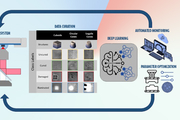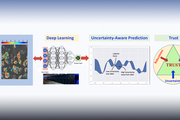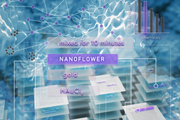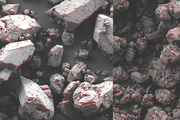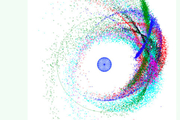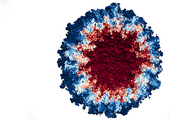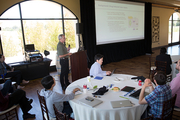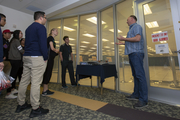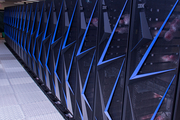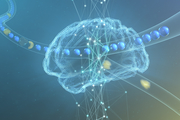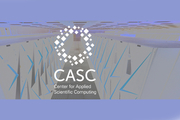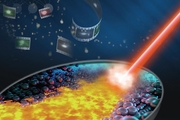Did you know we have a monthly newsletter? View past volumes and subscribe.
Lawrence Livermore computer scientist heads award-winning computer vision research
Jan. 8, 2021 -
The 2021 IEEE Winter Conference on Applications of Computer Vision (WACV 2021) on Wednesday announced that a paper co-authored by LLNL computer scientist Rushil Anirudh received the conference’s Best Paper Honorable Mention award based on its potential impact to the field. The paper, titled "Generative Patch Priors for Practical Compressive Image Recovery,” introduces a new kind of prior—a...
Machine learning model may perfect 3D nanoprinting
July 29, 2020 -
Two-photon lithography (TPL)—a widely used 3D nanoprinting technique that uses laser light to create 3D objects—has shown promise in research applications but has yet to achieve widespread industry acceptance due to limitations on large-scale part production and time-intensive setup. LLNL scientists and collaborators turned to machine learning to address two key barriers to industrialization...
LLNL papers accepted into prestigious conference
July 9, 2020 -
Two papers featuring LLNL scientists were accepted in the 2020 International Conference on Machine Learning (ICML), one of the world’s premier conferences of its kind. Read more at LLNL News.
Lockdown doesn’t hinder annual Data Science Challenge
June 26, 2020 -
Due to the COVID-19 pandemic and shelter-in-place restrictions, this year’s Data Science Challenge with the University of California, Merced was an all-virtual offering. The two-week challenge involved 21 UC Merced students who worked from their homes through video conferencing and chat programs to develop machine learning models capable of differentiating potentially explosive materials from...
UC Merced students receive NSF research fellowships
June 3, 2020 -
Maia Powell, a PhD student in Applied Mathematics at UC Merced, has been awarded a National Science Foundation Graduate Research Fellowship. Powell participated in the DSI's Data Science Challenge this summer, serving as a team lead for other students. Read more at UC Merced.
Lab team studies calibrated AI and deep learning models to more reliably diagnose and treat disease
May 29, 2020 -
A team led by LLNL computer scientist Jay Thiagarajan has developed a new approach for improving the reliability of artificial intelligence and deep learning-based models used for critical applications, such as health care. Thiagarajan recently applied the method to study chest X-ray images of patients diagnosed with COVID-19, arising due to the novel SARS-Cov-2 coronavirus. Read more at LLNL...
AI identifies change in microstructure in aging materials
May 26, 2020 -
LLNL scientists have taken a step forward in the design of future materials with improved performance by analyzing its microstructure using AI. The work recently appeared online in the journal Computational Materials Science. Read more at LLNL News.
Interpretable AI in healthcare (PODCAST)
May 17, 2020 -
LLNL's Jay Thiagarajan joins the Data Skeptic podcast to discuss his recent paper "Calibrating Healthcare AI: Towards Reliable and Interpretable Deep Predictive Models." The episode runs 35:50. Listen at Data Skeptic.
Building knowledge and insights using machine learning of scientific articles
May 5, 2020 -
Nanomaterials are widely used at LLNL and in industry for many applications from catalysis to optics to additive manufacturing. The combination of nanomaterials’ shape, size, and composition can impart unique optical, electrical, mechanical, or catalytic properties needed for a specific application. However, synthesizing a specific nanomaterial and scaling up its production is often...
The incorporation of machine learning into scientific simulations at LLNL (VIDEO)
May 5, 2020 -
In this video from the Stanford HPC Conference, Katie Lewis presents "The Incorporation of Machine Learning into Scientific Simulations at Lawrence Livermore National Laboratory." Read more and watch the video at insideHPC.
Machine learning accelerates high-performance materials development
Feb. 13, 2020 -
Lawrence Livermore National Laboratory (LLNL) and its partners rely on timely development and deployment of diverse materials to support a variety of national security missions. However, materials development and deployment can take many years from initial discovery of a new material to deployment at scale. Now, an interdisciplinary team of LLNL researchers from the Physical and Life Sciences...
Big data illuminates the physical sciences
Nov. 6, 2019 -
Livermore teams are applying innovative data analysis and interpretation techniques to advance fundamental science research. This article describes projects in astrophysics and materials science. Read more at Science & Technology Review.
Successful simulation and visualization coupling proves the power of Sierra
Oct. 22, 2019 -
As the first National Nuclear Security Administration (NNSA) production supercomputer backed by GPU- (graphics processing unit) accelerated architecture, Sierra’s acquisition required a fundamental shift in how scientists at Lawrence Livermore National Laboratory (LLNL) program their codes to take advantage of the GPUs.
The majority of Sierra’s computational power—95 percent of its 125...
Collaboration drives data science workshop
Sept. 12, 2019 -
Lawrence Livermore National Laboratory’s (LLNL’s) Data Science Institute (DSI) hosted its second annual workshop on July 23–24, 2019. Co-sponsored by the University of California (UC) system, the event drew more than 200 participants to Garré Winery in Livermore. A common theme ran throughout both days: Collaboration is always welcome.
Indeed, feedback from last year’s workshop inspired a...
LLNL Center for Applied Scientific Computing: accelerating scientific discovery (VIDEO)
July 12, 2019 -
The Center for Applied Scientific Computing (CASC) serves as LLNL’s window to the broader computer science, computational physics, applied mathematics, and data science research communities. Major thrust areas in CASC research include: (1) Increasing simulation fidelity by integrating multi-physics and multi-scale models, increasing resolution through advanced numerical methods and more...
Two-week workshop lets UC Merced students step into shoes of Lab computer scientists
June 12, 2019 -
From May 20-31, 21 undergraduate and graduate students, many of them first-generation college students, interned at the Lab. While they were on site, the students, along with their Lab mentors, were tasked with using machine learning and other computational methods to tackle real-world problems in computational immunology. Read more at LLNL News.
How machine learning could change science
April 29, 2019 -
Artificial intelligence tools are revolutionizing scientific research and changing the needs of high-performance computing. LLNL has been exploiting the relationship between simulation and experiments to build predictive codes using machine learning and data analytics techniques. Read more at Data Center Dynamics.
Researchers explore machine learning to automate sorting of microcapsules in real-time
April 16, 2019 -
Micro-Encapsulated CO2 Sorbents (MECS) — tiny, reusable capsules full of a sodium carbonate solution that can absorb carbon dioxide from the air — are a promising technology for capturing carbon from the atmosphere. To create the caviar-like objects, scientists run three fluids through a series of microfluidic components to create drops that turn into capsules when exposed to ultraviolet...
CASC research showcased at major data science venues
March 20, 2019 -
Researchers from LLNL’s Center for Applied Scientific Computing (CASC) are among the Lab’s employees making waves in the data science community, with many prominent accolades, publications, and acceptances in 2018. Data science encompasses some of the hottest technology topics—machine learning (ML), “big data” analysis, artificial intelligence, computer vision, and more—and the Center’s...
LLNL explores machine learning to prevent defects in metal 3D-printed parts in real time
Sept. 13, 2018 -
LLNL researchers have developed machine learning algorithms capable of processing the data obtained during metal 3D printing in real time and detecting within milliseconds whether a 3D part will be of satisfactory quality. Read more at LLNL News.


